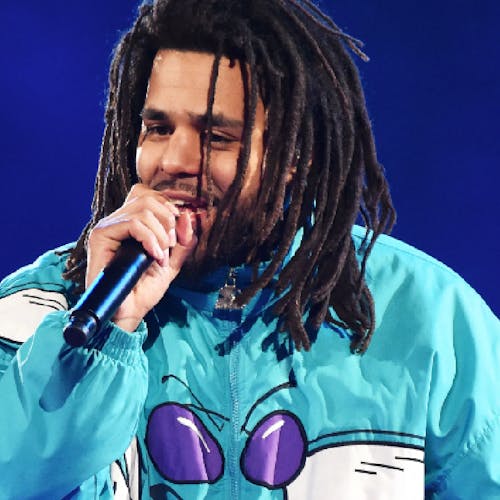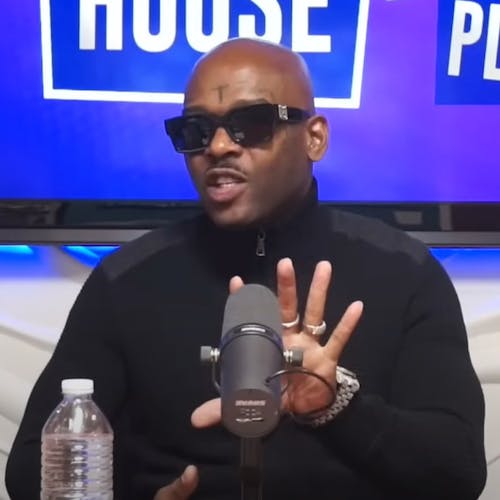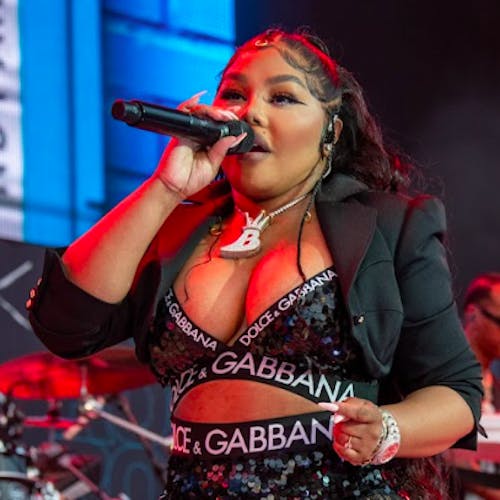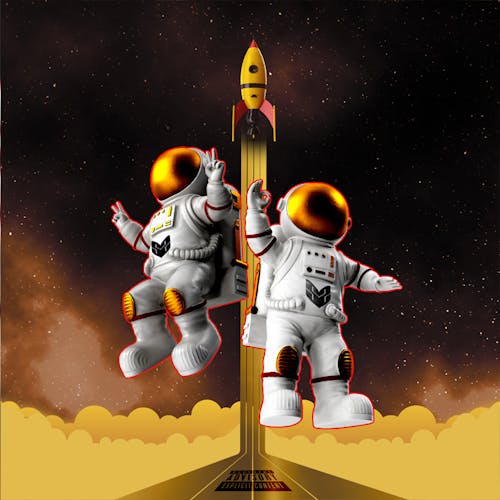
Immortal Technique's "Dance with the Devil" is a Morality Play for our Times
Immortal Technique's "Dance with the Devil" is a Morality Play for our Times
By Kevin Coval
Published Wed, November 30, 2022 at 2:00 PM EST
Immortal Technique is one of those MC's that epitomize a particular era of the culture. A moment when Hip-Hop was in a kind of identity crisis, wrestling with its newfound wealth and fame and the humble beginnings from which it came.
There was a debate, in cyphers and barbershops, in magazines, and on the train, about what was "real" and a growing and imaginary line between the underground and mainstream.
This debate and fictive division seem ludicrous in 2023 (or does it with the number of subcultures within the culture, though to me, it's ALL Hip-Hop, just different brilliant, idiosyncratic iterations).
But at the time, there seemed to be two crews; the camps of backpack orthodoxy and the bottle-popping nouveau riche; you either were in the club or the streets; you had champagne aspirations or would rock Timbs eternally. Again, this dichotomy seems wild now, but post-Big's murder, this was a conversation that roared.
Immortal Technique, in real life, was in the streets as a battle rapper. The illest hustler earned his rep not only for his ferocity as a lyricist but also for his stint being incarcerated and his bully-like bravado, including well-documented high school run-ins with Lin Manuel-Miranda, who he reportedly would stuff into a locker (or garbage can?). The two are now friends and admire each other's humanitarian work.
Revolutionary Vol. 1, Immortal Technique's first album, was released independently on September 14, 2001, with money the Harlem-raised rapper made from time stalking the growing New York battle rap circuit. It included tracks like “Revolutionary,” “Dance With the Devil,” “The Poverty of Philosophy,” and the hidden track “Diabolic.”
He was on his non-industry indie grind selling hand-to-hand copies at battles, shows, and on the corner. A one-man brigade, Felipe Cornel learned the entrepreneurial spirit by moving product in NY's artistic and narcotic underground economy, from battle rap challengers to dudes buying blunts.
Revolutionary Vol. 1 impacted the U.S. and eventually the whole world. It got the rapper signed to a smaller indie label, Viper, and Tech became the only unsigned rapper to grab a highly coveted spot in The Source's "Hip Hop Quotable" section, cementing him in a kind of legendary status, particularly with the backpack set.
Immortal Technique quickly became a staple in underground circles, carrying the torch for what we refer to as "conscious rap," another phrase of the era perhaps meant to divide rather than unite, in part because all the artists' perspectives, in total, are revelatory in understanding the multifaceted experiences of the generation.
For many, it wasn't just Immortal Techniques' lyrics and rugged, enraged delivery that made him so appealing, but also his politics. In conversation with peers like Dead Prez, he followed in a tradition of Public Enemy and The Black Arts Movement before them. He introduced a racial AND economic critique of capitalism and the American way, made to sound fly as hell over breakbeats.
He assured us that he was indeed a socialist, but not the kind of feeble Scoobie Do & Shaggy-lookin mugs you find passing out flyers on a liberal arts college campus, but rugged in an all-Black everything bomber jacket and AF1 Highs laced and ready for war, on any terms; lyrically, mentally, spiritually. The infusion of this kind of critique informed his music and made a lasting imprint on the culture.
Of all the songs in Immortal Technique's discography, the one that may have more listens, and questions surrounding it, is his "Dance with the Devil," which appeared on Revolutionary Vol. 1. If you know or missed it, it's a challenging listen (and read, lyrically dense enough to consider following along on Rap Genius). No spoilers and not necessarily the space to recap the well-worn tale, BUT everyone does ask, is this song true?
Hip-Hop is a genre with a blurred line between entertainment and reality, and the blurring of that line is increasingly disturbing as the so-called justice system continues to use rappers’ lyrics against them in court.
So in "Dance with the Devil," the song's narrator describes in detail a horrific, first-person account of several unspeakable acts. As a testament to the pen-game of the rapper, many people wonder or often think that he experienced or witnessed these acts himself.
And a debate has emerged in the culture about authenticity or whose story one has access to share. I think of Jay Z's chastising of Nas about what he saw from his apartment window as if reportage or the novel were less of an art than narrative non-fiction.
But this question dovetails into questions of authenticity or realness. And because Immortal Technique presents or represents himself as someone so authentic, the question around this song and experience lingers.
However, the rapper has indeed addressed this question on several occasions. In a 2004 interview on BrownPride.com, he says of the song, "It was a true story that I made myself more of a part of when I wrote the song, it became an urban legend and was really about how we are killing ourselves and destroying the most valuable resource that the Latino/Black community has, our women."
DROP YOUR EMAIL
TO STAY IN THE KNOW
In 2012 in an interview on the YouTube channel Montreality, he said something a little different: "The only thing I changed about that story was me being on the roof."
He continues with an additional spin, "We are all the same people, and all think we can gain power by inflicting pain on other individuals, but true power comes from people loving you and willing to sacrifice for you."
And even more recently, on the Bootleg Kev podcast in November of last year, he said, "I can take people to the building where this incident did happen in Harlem," further adding to the urban legend and, in many ways, continuing to not to quell the speculation.
And I'm not sure if what happened or didn't or if it actually matters. Did Jesus really rock FOG moccasins, or were they bootlegged? What perhaps is more important, and certainly the role of the rapper/writer/journalist, are the stories we tell about what happens.
And for Immortal Technique, like many rappers and writers before and after him, I feel like "Dance with the Devil" is a morality play, an allegory or kind of contemporary myth-making, like a new school, disturbing interpolation of King Oedipus.
There are stories in the tradition of KRS-ONE's "Love's Gonna Get'cha," Ice Cube's "Us," Slick Rick's "Children's Story" (and Mos Def's interpolation) that are meant to be a guide through the terrain and pitfalls of adolescence and maturation. Hip-Hop, after all, is a latch-key kid cultural form (to paraphrase Dr. Cornel West) where young people are tasked with raising themselves and one another.
Immortal Technique gives us the framing out the gate in the first verse when he spits of the main character Billy Jacobs:
He felt he had to prove to everyone he was evil
A feeble-minded young man with infinite potential
The product of a ghetto-bred capitalistic mental
And boom. An articulation of the real trap; patriarchal racialized capitalism (to paraphrase bell hooks).
In truth, this song is about peer pressure and having to fit in to "keep it real." William, a young man, is struggling for communal and self-acceptance and heads down a path of chaos and hyper-violence.
And there is something Buddhist in Immortal's technique, the visceral and vivid depictions of misogynistic violence over 44 Caliber's cinematic scoring, is to highlight the frequency in which violence against women occurs everywhere, not just in urban communities decimated by a paucity of resources and the prison industrial complex and school to prison pipeline.
The rapper is asking us to take account of our mothers and sisters and wives and partners AND also pointing out, as he has done in subsequent interviews, that the rates of assault against women are high everywhere in our country, especially in the military and college campuses (which is not where the incident in the song occurs.)
The rapper is making art about the darkness, holding a mirror to our faces as a society and as men, and asking more from us. Versions of "Dance with the Devil" happen daily at every level of society. Part of what Hip-Hop, in its highest form, is and can be, is a path toward rupturing self and communal cycles of violence and finding new stories to tell and remix and create and extend our cyphers and jams to be more inclusive and safer for us all.



